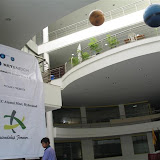For close to two and half decades of my programming life, the name Dennis Ritchie has become a synonym for simplicity, elegance, portability and efficiency.
My love for the C language started very casually and grew with time. Having been exposed to other programming languages like BASIC, Fortran and Pascal, it took me two full days to learn the syntax of the C language. But it took me several years to understand and effectively use the semantics of various aspects of the language. Once I started learning about the early C++ interpreters on Unix language and how object oriented semantics are implemented in C language (using compilers and preprocessors together), my love for the language and its innovators kept on increasing.
The journey with the Unix operating system became more of a life than love itself. Each variant or derivative of Unix I ever worked with, including HP-UX, SCO, UCB, Magnix, Linux and Solaris in particular, led to immense passion and respect towards the fundamentals behind Unix – all the qualities I attributed to Dennis in the first sentence above. These qualities are the reason why the applications and appliances built using the core and its paradigms touch us day in and day out, directly or indirectly. (For more on these qualities, read The Practice of Programming – here and here.)
Even though Dennis is no more today, his impact will still be felt for decades to come.
Quoting Dave Tong (@davetong) on twitter:
If Steve Jobs changed the world then Dennis Ritchie created it.
All I can say is a big thank you to Dennis Ritchie, for his silent yet powerful life. It changed our lives. RIP.


